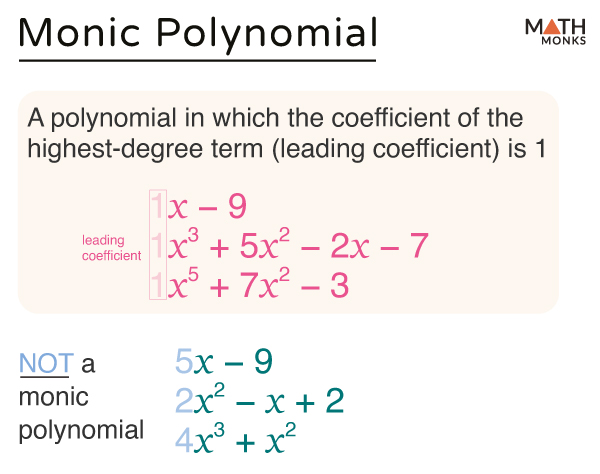A monic polynomial is a polynomial in which the coefficient of the term with the highest degree (the leading term) is 1.
Mathematically, for a polynomial in general form P(x) = anxn + an – 1xn – 1 + … + a1x + a0, it is monic if an is 1
For example,
In the polynomial P(x) = x3 – 4x + 7, the leading coefficient is 1. Thus, P(x) is a monic polynomial.
Here are a few more examples of monic polynomials:
- Q(x) = x2 + 5x + 6 (monic quadratic polynomial)
- R(x) = x3 – 25 (monic cubic polynomial)
- T(x) = x4 + 2x2 + 1 (monic quartic polynomial)
- F(x) = x – 11 (monic linear polynomial)
Note: 1 is a monic polynomial, as the leading coefficient of the polynomial is 1.
However, the following polynomials are not monic as their leading coefficients are not 1:
- f(x) = 7x2 + 6
- g(x) = 3x4 – 2x2 + x – 4
- k(x) = 2x7 – 11x5 + 5
In summary, a monic polynomial must have a leading term where the highest power of the variable is not multiplied by anything other than 1.
Solved Examples
![]() Determine whether the following polynomials are monic:
Determine whether the following polynomials are monic:
a) x3 + 2x2 – x + 4
b) 5x2 – 3x + 1
c) x4 – x3 + x2 – x + 1
Solution:
![]()
a) Given, x3 + 2x2 – x + 4
Here, the leading coefficient is 1
Thus, it is a monic polynomial.
b) Given, 5x2 – 3x + 1
Here, the leading coefficient is 5
Thus, it is not a monic polynomial.
c) Given, x4 – x3 + x2 – x + 1
Here, the leading coefficient is 1
Thus, it is a monic polynomial.
![]() Convert the following polynomials to monic form:
Convert the following polynomials to monic form:
a) 4x3 – 8x + 12
b) 2x2 + 6x + 10
Solution:
![]()
a) Given, f(x) = 4x3 – 8x + 12
On dividing each term by 4,
g(x) = x3 – 2x + 3
Here, the leading coefficient is 1
Thus, g(x) is a monic polynomial.
b) Given, f(x) = 2x2 + 6x + 10
On dividing each term by 2,
g(x) = x2 + 3x + 5
Here, the leading coefficient is 1
Thus, g(x) is a monic polynomial.

